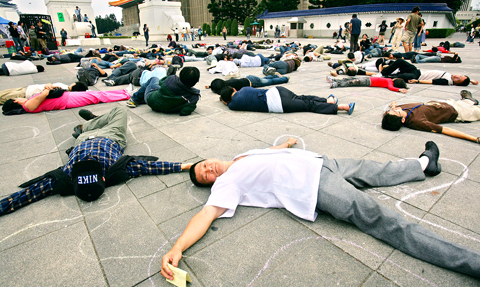The Wild Strawberry Student Movement held a mock “memorial service” yesterday for human rights at the National Taiwan Democracy Memorial Hall.
Wearing white head coverings and face masks, a few dozen protesters gathered at Liberty Square, carrying placards that read “Freedom of speech” and “Free from violence” and offering their “condolences” to rights they said have been trampled by the government.
The memorial service “symbolizes our sadness toward [the government’s] violations of human rights during [Association for Relations Across the Taiwan Strait Chairman] Chen Yunlin’s [陳雲林] stay in Taiwan,” said Lo Shih-hsiang (羅士翔), a spokesman for the movement.

PHOTO: CNA
The students began their silent sit-in on Nov. 6 to protest what they called excessive police force against demonstrators who opposed Chen’s visit between Nov. 3 and Nov 7.
After police removed the students from outside the Executive Yuan, they moved their demonstration to the square on Nov. 7.
The group has continued its demonstrations at the square every day, calling for immediate amendments to the Assembly and Parade Law (集會遊行法) to scrap regulations requiring police approval for demonstrations.
The students had sent out “notices of death” of the nation’s human rights to politicians across party lines, including President Ma Ying-jeou (馬英九), Premier Liu Chao-shiuan (劉兆玄), Chinese Nationalist Party (KMT) Chairman Wu Poh-hsiung (吳伯雄) and Democratic Progressive Party (DPP) Chairperson Tsai Ing-wen (蔡英文), and to National Police Agency Director-General Wang Cho-chiun (王卓鈞) and National Security Bureau Director-General Tsai Chao-ming (蔡朝明). Only Tsai attended the mock funeral.
When approached by reporters, Tsai said she wanted to encourage the students, but that she did not want their demonstration to be labeled as an activity organized by the pan-green camp.
Speaking on the assembly law, Tsai said the former DPP administration “failed to pay enough attention or push for amending or abolishing the Assembly and Parade Law. We feel very sorry.”
The students also expressed opposition yesterday to a requirement by the Ministry of Justice that schools nationwide recruit personnel to implement government ethics policies.
The ministry sent formal notices to all government branches asking schools, government agencies and state-run enterprises to recruit the personnel.
The move drew widespread criticism across party lines, with many legislators calling the measure reminiscent of the Martial Law era, when all schools had human resource units in charge of spying on public servants and reporting back to the ministry.
The DPP caucus said the ministry’s requirement may violate the 1992 Act Governing the Establishment of the Government Employee Ethics Units and Officers (政風機構人員設置條例), which says the legislature, local councils, military agencies and public schools do not need to establish such units.
“The students of the Wild Strawberry Student Movement are worried that schools ... will be threatened by the White Terror again,” the students said in a press release.

A preclearance service to facilitate entry for people traveling to select airports in Japan would be available from Thursday next week to Feb. 25 at Taiwan Taoyuan International Airport, Taoyuan International Airport Corp (TIAC) said on Tuesday. The service was first made available to Taiwanese travelers throughout the winter vacation of 2024 and during the Lunar New Year holiday. In addition to flights to the Japanese cities of Hakodate, Asahikawa, Akita, Sendai, Niigata, Okayama, Takamatsu, Kumamoto and Kagoshima, the service would be available to travelers to Kobe and Oita. The service can be accessed by passengers of 15 flight routes operated by

Chinese spouse and influencer Guan Guan’s (關關) residency permit has been revoked for repeatedly posting pro-China videos that threaten national security, the National Immigration Agency confirmed today. Guan Guan has said many controversial statements in her videos posted to Douyin (抖音), including “the red flag will soon be painted all over Taiwan” and “Taiwan is an inseparable part of China,” and expressing hope for expedited reunification. The agency last year received multiple reports alleging that Guan Guan had advocated for armed reunification. After verifying the reports, the agency last month issued a notice requiring her to appear and explain her actions. Guan

GIVE AND TAKE: Blood demand continues to rise each year, while fewer young donors are available due to the nation’s falling birthrate, a doctor said Blood donors can redeem points earned from donations to obtain limited edition Formosan black bear travel mugs, the Kaohsiung Blood Center said yesterday, as it announced a goal of stocking 20,000 units of blood prior to the Lunar New Year. The last month of the lunar year is National Blood Donation Month, when local centers seek to stockpile blood for use during the Lunar New Year holiday. The blood demand in southern Taiwan — including Tainan and Kaohsiung, as well as Chiayi, Pingtung, Penghu and Taitung counties — is about 2,000 units per day, the center said. The donation campaign aims to boost

The Central Weather Administration (CWA) said a magnitude 4.9 earthquake that struck off the coast of eastern Taiwan yesterday was an independent event and part of a stress-adjustment process. The earthquake occurred at 4:47pm, with its epicenter at sea about 45.4km south of Yilan County Hall at a depth of 5.9km, the CWA said. The quake's intensity, which gauges the actual effects of a temblor, was highest in several townships in Yilan and neighboring Hualien County, where it measured 4 on Taiwan's seven-tier intensity scale, the CWA said. Lin Po-yu (林柏佑), a division chief at the CWA's Seismological Center, told a news conference